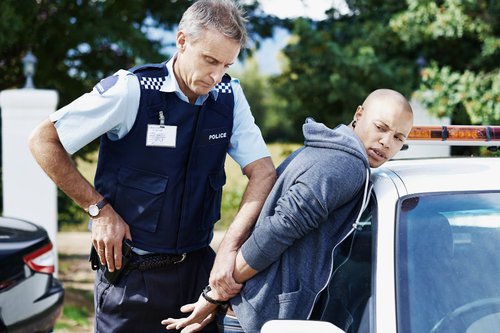Top Holidays for DUI Arrests in Canada

Canadian police arrested 42,585 people for driving under the influence (DUI) of alcohol or drugs during 2020, with 14,667 of these arrests occurring in Ontario, according to Statistics Canada's " Incident-Based Crime " reporting. While there is limited statistical data on the timing of Canadian DUI arrests, plenty of evidence suggests that a significant number of annual DUI arrests—Canada-wide and Ontario—are made during holiday periods. In fact, police across North America are fully aware that people are more likely to drive while impaired during holidays than during other periods. As such, police agencies across Canada tend to make a concerted effort to arrest impaired drivers during holidays. Let's take a closer look at what we know about impaired driving and holidays.
Holidays Correlate with Increase in Impaired Driver-Related Fatalities
Researchers have long noticed that alcohol-related automobile accident fatalities spike during North American holidays. This makes sense because holidays tend to extend weekends and weekends are typically when people drink the most. Weekends are also when people are most likely to die in impaired-driver-related accidents, as almost 50% of all accidents involving an impaired driver occur on weekends.
Figuring out which holidays cause the most alcohol-related traffic fatalities is problematic because such specific data isn't collected consistently and, in Canada, hardly at all. In general, researchers estimate that impaired driving was a contributing factor in 24% to 30% of annual fatal traffic fatalities in the U.S from 2016-2019. The latest estimates we could find for similar Canadian data cover 2014-2016. According to Mothers Against Drunk Driving Canada, 55.4% of Canadian traffic fatalities in 2014 occurred in "crashes in which an individual was positive for alcohol or drugs." The Traffic Injury Research Foundation Canada reported that 26.9% of 2015 fatalities in Canadian traffic crashes "involved a drinking driver." Meanwhile, a 2016 U.S. Centers for Disease Control and Prevention report pegged Canada's impaired-driver-related fatality percentage at 34%, the highest rate among the world's wealthiest countries (with the U.S. coming in at second with 31%).
Several different organizations track U.S. impaired-driving fatalities during the holidays, but their respective numbers do not always agree. Depending upon the holiday and tracking organization, the percentage of vehicle accident fatalities caused by impaired driving rises to 32% to 51% during holidays.
The National Safety Council believes that the most alcohol-related traffic fatalities occur on New Year's Eve/Day. Still, the Insurance Institute for Highway Safety (IIHS) wavers between New Year's Day and July 4 th . On average, IIHS says that January 1 st is the deadliest day for alcohol-related accidents, but some reports issued by the institute claim July 4 th — America's Independence Day — as the most lethal.
These and other organizations that track drinking and driving statistics point to other holiday periods being almost equally dangerous. Excepting Christmas Day itself (which is one of the safest days of the year to drive), impaired-driving-related fatalities tend to be higher during the entire Dec. 23-Jan. 1 holiday period than during the rest of the year. American Thanksgiving—which is a four-day weekend for many Americans—is considered by most entities as the third most deadly holiday for alcohol-related traffic accidents. While Labor Day weekend is also cited for a higher number of alcohol-related traffic fatalities, Memorial Day weekend is surprisingly not. According to reporting organizations, even the quasi-holidays of St. Patrick's Day, Cinco de Mayo, Halloween, and Superbowl Sunday show increased rates of impaired-driving-caused fatalities.
Does the U.S. Data Extrapolate to Canada?
While no organizations seem to track Canadian holiday-related impaired driving fatalities, we believe that U.S. data can be extrapolated in part to cover Canada. The countries share many similarities overall and have similar DUI laws and rates of impaired-driving fatalities. The countries share the same significant Christmas and New Year's holidays but have different Thanksgiving periods, and America's Independence Day is similar in many respects to Canada Day. Many Canadians also celebrate some of the lesser/quasi holidays, though perhaps not quite as enthusiastically as Americans.
Anecdotal evidence strongly suggests that more Canadians drive while impaired during holidays and that holidays are marked by an increase in impaired-driving-related accidents and fatalities. The DUI lawyers at TorontoDUI can certainly attest to the first point, as we see a marked increase in demand for our services after major holidays.
Police agencies across Canada certainly believe this is the case, given that they tend to mount aggressive anti-impaired driving campaigns and initiatives during the major holidays. The Christmas-New Year's holiday season draws particular police attention, with most provincial initiatives targeting impaired driving lasting from early December to New Year's Day. Canada Day likewise gets plenty of attention, with some provinces stretching their anti-impaired driving campaigns through the whole month of July. Many provinces and police departments also make a point of cracking down on impaired driving during the Labour Day and Thanksgiving weekends.
Even when provinces and police departments don't mount a distinct initiative for a particular holiday, they are well aware that the number of people drinking — and subsequent number of people driving while impaired — is higher than usual. As such, they tend to keep a much closer watch out for potential impaired drivers. This holds true for the lesser and quasi holidays, too, because any excuse to celebrate marks a likely increase in impaired driver numbers.
Ontario Police Target Holiday Impaired Drivers with Ride
Ontario Police agencies rely on the Reduced Impaired Driving Everywhere program to target holiday-related impaired driving. During RIDE, police use roadside or moving checkpoints to briefly stop and question drivers to determine whether they might be impaired. Police can demand roadside breath samples to further assess impairment, which can lead to a subsequent arrest for DUI. Refusing to provide a breath sample will also lead to an arrest, with DUI-related charges that carry the same penalties if found guilty.
Police must conduct RIDE program stops under strict legal mandates to protect a driver's Charter Rights. The Supreme Court of Canada has ruled that the RIDE program can only be used to briefly stop drivers to assess potential impairment. Besides assessing sobriety, police can only conduct a spot check of the driver's license, registration, insurance, and vehicle inspection sticker. Police cannot search the vehicle or take other investigatory actions, although there are exceptions, such as the officer witnessing an obvious criminal infraction during the stop.
Ontario police departments haven't released much information about DUI arrests over the recent Christmas-New Year's holiday season. However, the Toronto Police Department reported that they arrested the highest-ever number of impaired drivers during a single weekend at the start of their seasonal RIDE efforts. In all, Toronto Police arrested 34 people for DUI-related charges from 6 p.m. on Dec. 3 rd to 6 a.m. on Dec. 6 th .
While it's unclear when police in Ontario or the Greater Toronto area will mount their next RIDE campaign, we highly doubt that they will use it for the lesser Valentine's Day holiday but suppose that it could be used during St. Patrick's Day. Actually, they might use RIDE anytime because the program is not solely tailored to target holiday driver impairment.
Consult with TorontoDUI for Your DUI Defence!
If you have been arrested for DUI due to RIDE or otherwise, contact the highly experienced criminal DUI lawyers at Mass Tsang. We understand precisely how police are supposed to conduct RIDE stops and have proven adept at getting DUI charges dismissed when police fail to conduct them as required. With more than 15 years of successfully defending Greater Toronto Area DUI defendants, the criminal trial DUI lawyers at TorontoDUI have secured favorable outcomes for 100s of clients. If you or someone you know has been charged with a DUI-related offence in the GTA, contact TorontoDUI for a free consultation.
